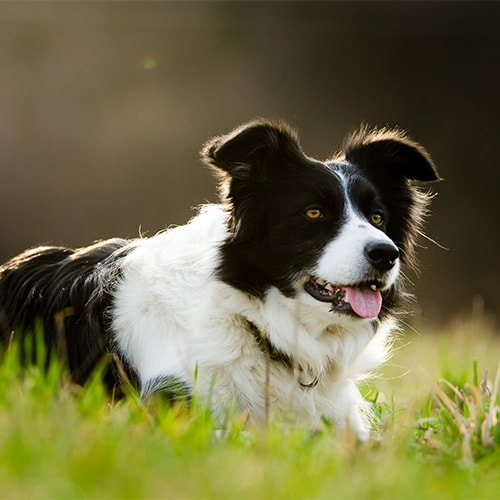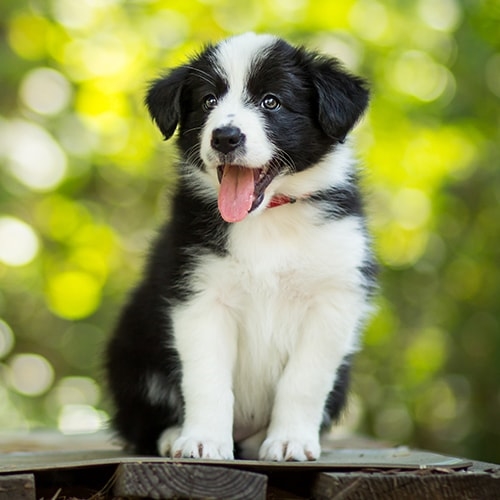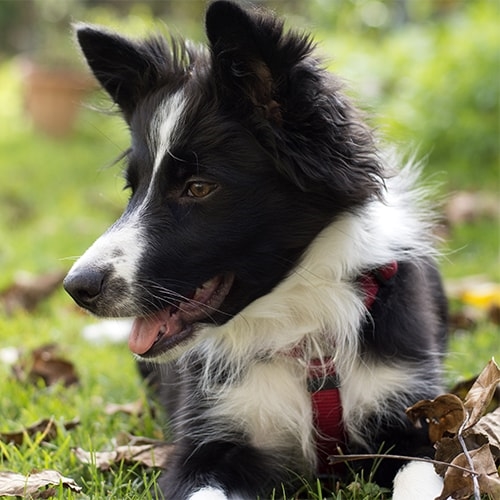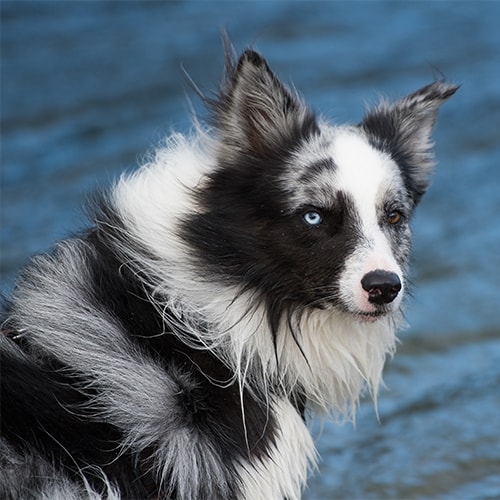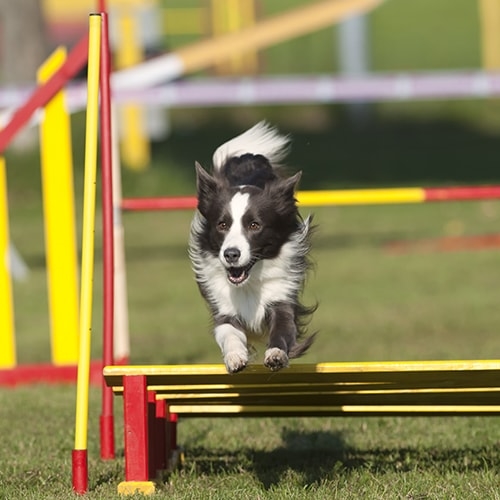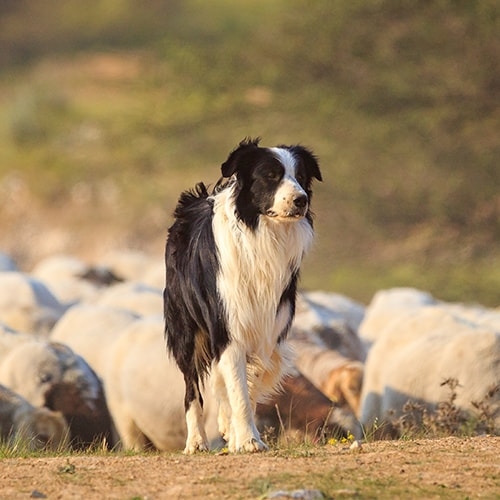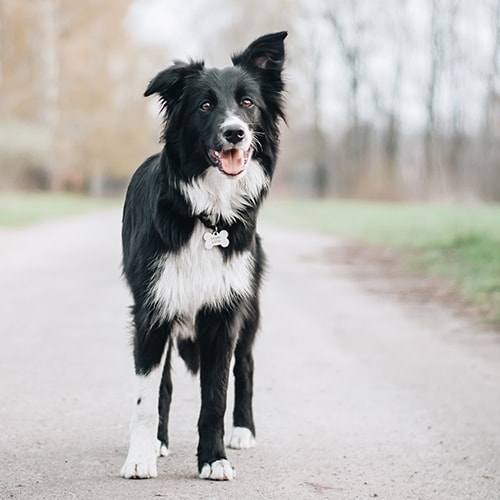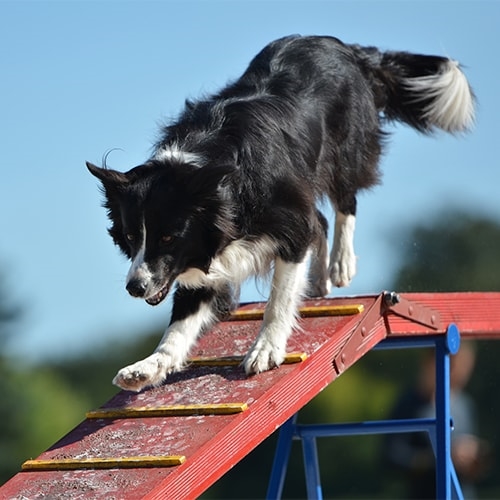| Size | Medium |
|---|---|
| Average height | 53 cm |
| Average weight | 25-30kg |
| Average lifespan | Over 12 years |
| Minimum exercise (per day) | 2 hours |
| Coat length | Medium |
| Minimum cost (per month) | £80 |
Border Collies are intelligent dogs who love to be on the go all the time! They thrive off plenty of exercise and lots to keep them occupied and are known for their stealth, speed and herding instinct.
Originally bred for herding sheep, Border collies are still used as working dogs on farms today but have also become much loved family pets. They make the ideal dog for active owners who will take them out on plenty of adventures and make sure they have plenty to do all the time.
Common health problems in Border Collies
Border Collies are great dogs for the right owners and will be your best friend if you take them out for lots of walks! Unfortunately, like so many other purebred dogs, they are at risk of certain problems and conditions relating to their breed.
If you are thinking of buying a Border Collie puppy, make sure the parents of your puppy have had the relevant health screening to reduce the chances of your puppy being affected by certain conditions. We’d recommend looking for a Kennel Club Assured Breeder as they meet extra requirements which will benefit your puppy’s health.
- Hip dysplasia – where hip joint that doesn’t fit together perfectly, which will eventually lead to arthritis. Before breeding, dogs should be screened by x-rays through the BVA/Kennel Club Hip Dysplasia Scheme.
- Collie eye anomaly – an abnormality in the back of the eye. There is currently testing available for this.
- Epilepsy – a brain disorder causing seizures.
- Imerslun-Gräsbeck Syndrome/ Cobalamin Malabsorption (IGS) – inherited blood disorder.
- Multi Drug Resistancy (MDR -1) – increased sensitivity to some commonly used medications.
- Ceroid lipofuscinosis (CL) – a cellular disorder which causes premature death. There is currently testing available for this.
- Sensory Neuropathy (SN) – a nerve disease affecting mobility. There is currently testing available for this.
- Goniodysgenesis (Pre disposition to glaucoma) – increased pressure within the eye can increase and cause extreme pain and potential eye loss. There is currently BVA/KC screening for this.
- Trapped Neutrophil Syndrome (TNS) – an inherited health condition that slows their ability to fight illness or disease. There is currently testing available for this.
If you want to minimise the risk of your dog getting problems, you can read our advice on choosing a pedigree dog.
Caring for your Border Collie
Collies are super high energy dogs who love being out and about with their owners. They do really well in active households and with experienced owners. While they might not be the best dogs for first time owners, owners with experience can find them easy to train and eager to please!
Like most breeds, Collies prefer to have company all the time. A bored Collie is very bad news indeed! If left alone or not given enough exercise, your Collie will certainly let you know they’re unhappy by chewing anything in paw’s reach!
Border Collies and barking
As with any dog, your Border Collie is likely to make some noise. How much they vocalise is down to each dog’s individual personality (and whether they have enough exercise and mental stimulation to keep them occupied). Collies usually go one of two ways – some vocalise a lot whereas others can be relatively quiet. Because they are so energetic, many owners find that the more exercise and mental stimulation they’ve had in a day, the quieter their Collie is! If you’re having problems with excessive noise or barking, we recommend seeking the advice of an accredited behaviourist.
Training and socialisation
Border Collies are known for being highly intelligent dogs and can be easy to train with experienced owners. It’s important to start positive, reward-based training from an early age and this needs to continue throughout your Collie’s life. You may find your Collie really enjoys training sessions and picks up new commands quickly, so many benefit from going to training classes where they can learn more advanced commands. You can search for local classes online.
It’s important to socialise your Collie with lots of experiences and other dogs from a young age to help them become a well-rounded, confident dog. Usually Collies prefer to do their own thing and so might not take much of an interest in greeting other dogs. Make sure you know how to recognise signs your dog is unhappy so you can prevent any aggression developing.
Like many dogs, Collies don't do well on their own. Because they're so high energy, they ideally need to be in a home where someone is around all the time to keep them active and make sure they don't get bored.
Exercise
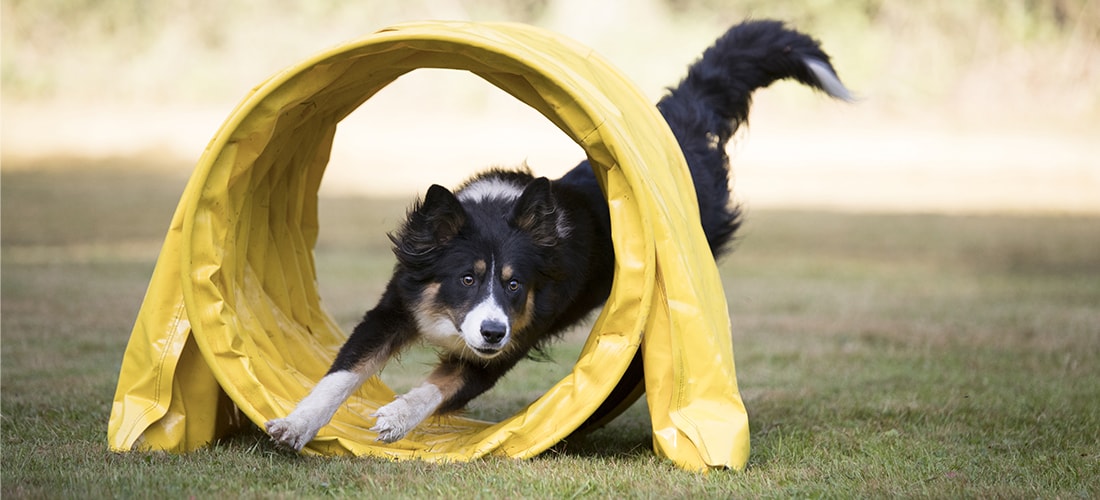
Be prepared – Border Collies are extremely active dogs! They need plenty of exercise every day to burn off all their energy and so suit active households really well. If you enjoy being outdoors a lot and know plenty of places your Collie can enjoy some safe, off-lead running then they could be a great breed for you. Owners considering a Collie will need a large, secure garden for them to play and run in between walks.
Your Collie will need a minimum of two hours exercise every day, but with Collies the more, the better! We’d recommend spreading this across the day in several walks with off-lead exercise in a secure area. On top of this, Collies love to keep their brains active, too! Make sure you have plenty of time to play with your dog, have training sessions and create some games that will really challenge their minds. Puzzle feeders are great for Collies.
Many Collies will also enjoy games that combine a lot of exercise with mental stimulation. Agility and flyball are some of the things that your Collie may really enjoy – have a look online to see if there is anywhere you can do these locally with your dog.
Grooming
Collies aren’t too high maintenance on the grooming front. You should definitely expect them to shed – and more so in the spring and autumn – but they aren’t as bad as some other breeds. Brushing your Collie’s fur a couple of times a week should help keep on top of the dead hairs and keep their coat in good condition.
Some Collies are known for being a little mischievous, so you may find your Collie needs the occasional bath! Make sure you use an appropriate dog-friendly shampoo and check with your vet if you’re not sure what to use.
Border Collies and children
A well-socialised Collie is likely to get on well with children, however as they have such a strong herding instinct they may be tempted to ‘herd’ children! We wouldn’t recommend a Collie if you have smaller children as their herding sometimes involves bumping into them which could knock them over. An adult-only household or one with teenagers is best for Collies.
Always supervise your Collie with children and vulnerable adults to avoid any accidents. While your collie will enjoy company, not everyone is prepared for such a high energy dog!
Border Collies and other pets
A well-socialised Collie should get along fine with other dogs. While they prefer human company, as long as they have had lots of positive experiences with other dogs from a young age you might find your Collie is sociable with others.
If your Collie has lived with another pet in the house from a young age they should get along with them. However, you might find they try to herd them to it’s important to supervise your Collie with other pets.
Food
Your Border Collie’s diet will vary depending on their age. You’ll need to feed them a complete, balanced dog food to keep them slim and healthy.
Your vet will be able to tell you how much your Collie should be eating. You should feed them a good quality, commercially available, complete dog food. We usually recommend splitting their daily allowance into two meals. If you give your dog the occasional treat or use treats for training, remember to take this into account and reduce their daily allowance. Treats shouldn’t make up more than 10% of their daily calorie intake as this can unbalance their diet.
You should try to feed your dog at the same time every day to get them into a routine. Remember to leave at a gap after eating and before exercising.
The cost of owning a Border Collie
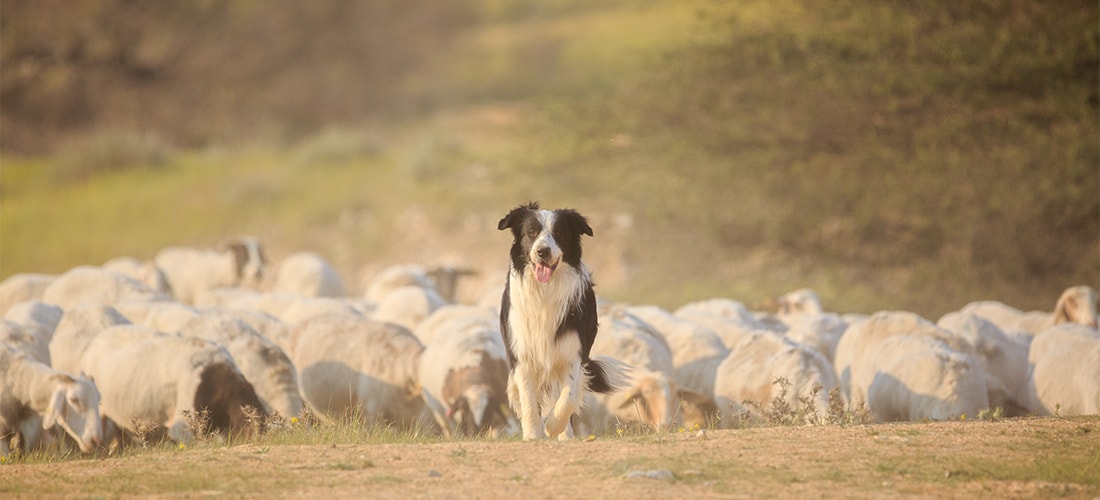
You can expect your Border Collie to cost you a minimum of £80 per month after purchase and set-up costs and over £13,000 across their lifetime.
Costs you’ll need to think about include:
Purchase costs
Adopting an adult Collie from a rescue centre may be a more cost-effective option, with the added advantage of giving a home to a pet without one – check if the rehoming centre you’re looking at asks for a donation for rehoming.
If instead you’re buying a Border Collie puppy from a breeder, you’ll need to factor in this cost. Beware unusually cheap puppies as they could come from a puppy farm. If you’d like to buy a pedigree puppy, we recommend looking for a Kennel Club Assured breeder. These breeders must do extra health tests and meet higher standards.
Set-up costs
- Puppy vaccines – if you rescue a dog, reputable centres will often vaccinate them for you. Remember that ongoing booster vaccinations will be needed to continue their immunity.
- Neutering – you should usually arrange for your dog to be neutered at around six months old, though your vet will be able to advise you exactly when is best. Check prices at your local practice as these will depend on your vet and where you live. Some rescue centres will neuter any dogs they rehome, saving you this cost.
- Equipment – including a collar and tags, lead, harness, dog beds, dog bowls, pet-safe toothpaste and toothbrushes, grooming brushes and toys. Keep in mind that all these will need to be replaced with wear or damage or if your dog outgrows or damages them!
Ongoing costs
- Food.
- Preventive healthcare – budget for routine vet visits to help stop your dog getting ill and catch any problems early. They need annual check-ups, vaccinations and regular flea and worming treatments. Check if your vet offers a health care plan as this can help spread the cost throughout the year.
- Vet bills* or pet insurance – if you don’t have pet insurance and your dog needs veterinary treatment for an injury or illness, costs can rapidly mount up. Check what’s covered and what isn’t when comparing policies.
- Accessories – including lots of poo bags, replacing worn toys and grooming accessories, buying doggy toothpaste and any other extras they might need.
Other costs
- Training – basic training is very important and dogs can benefit from formal classes. Some dogs may have, or develop, behavioural problems which might need professional management.
- Boarding – you may also need to budget for boarding or dog sitting costs if you are planning to go away from home on holiday.
- Dog walkers/day-care – you might consider a professional dog walker to keep your dog happy and healthy if you’re unable to get out with your dog enough yourself, or to look after them during the day if you need to be out for more than four hours.
* It’s always better to plan ahead and budget or get pet insurance in case your pet gets injured or unwell. If you are having difficulty with veterinary costs, you can check if you are eligible for treatment at PDSA here.
If you’re considering pet insurance, our PDSA Pet Insurance could be a great option for you and it’s quick and easy to get a quote online.
Fun facts
- Border Collies are believed to be one of the most intelligent breeds in the world.
- Their name comes from the border regions of England and Scotland where they were originally bred and worked in the hills.
- Herding is deep in their nature – many Collies still work on farms today and herding comes naturally to them.
- Because they're so clever, Collies are also used as search and rescue dogs.
Getting a Border Collie
Do plenty of research before getting a Border Collie. Owning one takes a lot of time and commitment and you need to make sure you’re able to give them all the exercise and stimulation they need to stay happy and healthy. Collies are loving and loyal dogs and you’ll get plenty in return for the time you spend with them.
Rehoming centres
There are plenty of rescue centres across the country where you may find a Border Collie. Breed-specific rescues that specialise in Collies are also out there. You’ll need to ask any rescue centre about the dog’s history to make sure they will be comfortable in your home. Good rescue centres should let you know of any health and behaviour problems.
Breeders
If you buy from a breeder, make sure your puppy will be well socialised and have all necessary screening tests, health checks and vaccinations. It’s really important that Collie puppies from a breeder get the right early socialisation so always ask the breeder about how they go about this. We recommend looking for a Kennel Club Assured breeder as they meet higher standards. We’ve put together some advice to help you find a good breeder.

